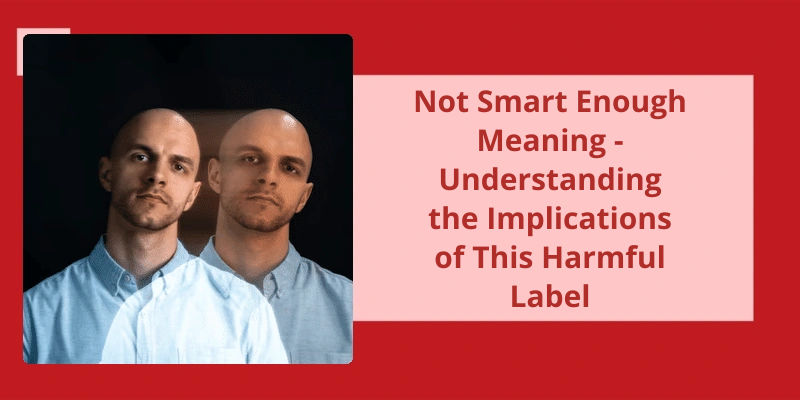As humans, our intelligence is often seen as the defining characteristic that distinguishes us from all other species on the planet. It allows us to reason, learn, problem-solve, and adapt to our surroundings. However, not all individuals possess the same level of intelligence. Some may be labeled as "unintelligent" or "not smart enough" due to an inability to comprehend certain concepts or perform tasks that are deemed easy by others. This can lead to negative stereotypes and discrimination that perpetuate the belief that intelligence is fixed and can't be improved upon. But in reality, intelligence is a complex trait that can be influenced by various factors such as genetics, environment, and experiences. Therefore, it’s important to recognize that just because someone may not excel in one area, it doesn’t define their worth or potential.
What Is the Definition of Not Smart Enough?
“Not smart enough” is a phrase that’s often used to describe someone who’s perceived as lacking intelligence or wisdom. This can refer to a variety of different traits or behaviors, such as difficulty with problem-solving, poor decision-making skills, or a general lack of common sense. In some cases, it may also refer to someone who’s physically or mentally challenged, and who may require additional support or resources to succeed.
Some individuals may have strengths in one area of intelligence but struggle in others, or may excel in creative or practical tasks but struggle with more abstract concepts. Additionally, factors such as upbringing, education, and life experience can all play a role in shaping a persons intelligence and abilities.
Ultimately, it’s important to approach the concept of intelligence with empathy and understanding, rather than using it as a basis for judgment or discrimination. Rather than labeling someone as “not smart enough,” it’s important to recognize their unique strengths and struggles, and to support them in developing their full potential.
Those who’re deemed “not smart enough” may face challenges in navigating certain aspects of daily life or pursuing certain career paths, and may require additional resources or support to succeed. However, it’s important to remember that intelligence is only one factor that contributes to success and fulfillment in life, and that there are many other qualities that can help individuals thrive, such as perseverance, creativity, and social skills.
Rather than focusing on labels or stereotypes, it’s important to approach each person with empathy, understanding, and a willingness to support them in reaching their full potential. By doing so, we can help create a more inclusive and supportive society that values and celebrates the unique gifts and strengths of every individual.
Have you ever felt like you’re not smart enough or doubted your own abilities? This is a common phenomenon known as impostor syndrome. However, there’s another explanation for this feeling called the Dunning-Kruger effect, which suggests that people who’re less skilled or knowledgeable often overestimate their abilities. Let’s take a closer look at this effect and how it can impact our perception of ourselves and others.
What Is It Called When You Feel Like You’re Not Smart Enough?
It’s a common feeling to undervalue oneself and find oneself lacking in intelligence. This feeling is particularly prevalent when a person is confronted with new information or novel situations that demand mental agility. The Dunning-Kruger Effect is a phenomenon that describes this cognitive bias of overestimating ones abilities, while simultaneously underestimating the abilities of others.
This effect has been studied in contexts ranging from social situations to academic environments and professional settings.
In fact, individuals with higher levels of education and intelligence are often more susceptible to the Dunning-Kruger effect. This is because they may be more confident in their abilities and less aware of the gaps in their knowledge.
For example, in education and employment, people may be promoted beyond their actual skills and abilities, leading to poor performance and potentially disastrous outcomes. Similarly, people may be led to make poor financial decisions based on their overconfidence in their knowledge of the stock market or investment strategies.
It can lead to both positive and negative outcomes, but it’s important for individuals to be aware of this bias and strive to maintain an accurate perception of their own abilities.
Source: You’re Really Not That Smart: The Dunning-Kruger Effect
Choosing the right words to describe someone’s intelligence level can be a delicate task. While it’s important to be able to provide honest feedback, there are certain terms that may come across as offensive or insensitive. In this article, we’ll explore some different ways to describe someone who may not be as intellectually gifted without resorting to derogatory language that could offend or hurt their feelings.
How Do You Say Someone Is Not Intelligent?
The ability to communicate effectively is essential in our lives, but sometimes, we find ourselves at a loss for words when attempting to describe someones intelligence. When we need to criticize someones cognitive abilities, there are many synonyms that can be used for “not intelligent.”. Some of these synonyms include “dumb,” “stupid,” “slow,” “simple,” “ignorant,” and “thick.”
The word “dumb” is commonly used to describe someone who lacks intelligence. However, this term is often considered offensive and insensitive. Similarly, “stupid” is also a derogatory term that suggests a person is incapable of learning or comprehension.
“Slow” is a more polite way to say someone lacks intelligence. It’s often used when referring to someone who isn’t quick to grasp concepts or has difficulty retaining information. “Simple” is another term used to describe someone whose mental capacity is limited or underdeveloped.
“Ignorant” refers to someone who lacks knowledge or understanding on a particular subject or matter. This term doesn’t necessarily suggest a lack of intelligence, but rather a lack of exposure or education in a specific area.
The word “thick” is often used in British English to describe someone who isn’t very intelligent. However, this term can also be considered slang and can be offensive to some people.
Finally, “foolish” and “dense” can also be used to describe someone who isn’t intelligent.
However, it’s important to choose our words carefully and be mindful of the impact they may have on others. Instead of resorting to derogatory terms, we should strive to communicate our criticism in a respectful and constructive manner.
Strategies for Improving One’s Own Cognitive Abilities and Overcoming Learning Challenges
- Practice active reading and note-taking techniques to help retain information
- Engage in regular brain exercises, such as puzzles or memory games
- Implement a consistent studying or learning schedule
- Make connections between new information and prior knowledge
- Break down complex ideas into smaller, manageable pieces
- Utilize mnemonic devices or memory aids to assist with recalling information
- Engage in reflective thinking and self-evaluation to identify areas for improvement
- Identify individual learning preferences and tailor study techniques accordingly
- Use resources such as tutors, study groups, or online resources to supplement learning
- Set achievable goals and track progress towards them
Feeling like you’re not smart enough can be a debilitating thought pattern that can hold you back from achieving your goals. It’s a common feeling that can impact all aspects of your life, from your career to your personal relationships. However, there are ways to overcome this feeling and regain confidence in your abilities. In this article, we’ll explore four effective ways to get over the feeling of not being smart enough.
How Do I Stop Thinking I’m Not Smart Enough?
Many people often find themselves feeling like they aren’t smart enough. This feeling can be debilitating and can hinder ones personal and professional growth. However, it’s essential to recognize that this feeling is just that – a feeling. It doesn’t define your intelligence or capabilities. Once you understand this, you can start working towards getting over this feeling.
Many people who struggle with this feeling tend to downplay their successes and achievements, dismissing them as mere luck or coincidence. However, it’s important to recognize and celebrate your accomplishments, no matter how small they may seem. By doing so, you can boost your confidence and recognize that you’re capable of achieving great things.
Envisioning where you want to be is another crucial step towards overcoming the feeling of not being smart enough. You need to set goals and have a clear direction of where you want to go in life. By having a clear vision, you can work towards it and gain confidence as you achieve each milestone. It’s essential to set realistic goals that are challenging but also achievable. With each goal, you achieve, you’ll gain more confidence and build momentum in your journey towards success.
Lastly, taking risks is another important step towards getting over the feeling of not being smart enough. You need to step out of your comfort zone and take risks that will challenge you and help you grow. It can be scary to take risks, but it’s only through taking risks that we grow and achieve great things. Each time you take a risk, you’ll gain more confidence and build momentum towards achieving your goals.
Identifying the Underlying Beliefs and Emotions Causing the Feeling of Not Being Smart Enough
This topic explores the process of recognizing the deep-seated thoughts and sentiments that contribute to the sensation of inadequacy regarding one’s intellectual abilities.
Conclusion
In conclusion, the term "not smart enough" is often used to describe individuals who’re perceived as lacking intelligence. This label is often unfairly applied to people based on their performance in certain tasks or social situations, without considering the complexity of their intelligence or their unique strengths. It’s important to recognize that intelligence takes many forms, and that individuals may excel in one area while struggling in another. Rather than using labels like "unintelligent" or "stupid," it’s more productive to focus on understanding and supporting individuals in their areas of strength, while providing resources and strategies to help them improve in areas where they struggle. By doing so, we can create a more inclusive and supportive environment that values the unique gifts and talents of every individual, and helps everyone to reach their full potential.





